- Home
- Upton Sinclair
O Shepherd, Speak! Page 10
O Shepherd, Speak! Read online
Page 10
One last duty Lanny had: to bid farewell to Heinrich Jung. There was nothing to be done with Heinrich now but to put him with the other officer prisoners; he would be shipped to America and have a chance to grow still stouter upon abundant American food in one of many summer-resort hotels. Lanny no longer worried about being mentioned, for he was getting out of the Bulge and wasn’t going to be captured.
A strange meeting that, between two enemy friends of twenty years’ standing. The poor Nazi Beamter had tears in his eyes—not so much over the parting with Lanny as the parting with his dream of victory. He had been close to all this fighting and had known that the Germans weren’t winning; now he knew that the corridor was open and new troops pouring in. It was the Americans’ confident hope to cut off the Bulge and trap all those bold Nazi heroes who had set out for Liége and Antwerp and the ending of the war. Heinrich knew how Hitler had told his generals that if this offensive failed the war was lost; and after twelve days of fighting it was no longer possible to doubt that the offensive had failed. It was a Götterdämmerung, the end of Adi Schicklgruber’s Thousand-Year Reich!
“Oh, such a tragic thing!” exclaimed the Oberst Oberführer. “It would have meant peace in Europe—it was the only chance. Do you Americans imagine you will be able to keep the peace in Europe?”
“I don’t know,” Lanny had to say. “We’re hoping to set up a new League of Nations.”
“Ach, was Unsinn! The Reds will have Europe, and you will be calling on us to help fight them.”
“That’s in the lap of the gods,” replied the other, and didn’t stop to argue because he had other farewells to say. He could understand that Heinrich’s grief wasn’t entirely altruistic. The Oberführer had sat in a fine office with a big desk and many push buttons and gadgets, and he had issued orders which determined the lives of hundreds of thousands of young men. Now all that glory was gone, and what would become of him? He might become night watchman of the building in which he had ruled!
Lanny said, “When you have a chance, write me in care of my father in Newcastle, Connecticut, and when the war’s over we’ll know more than we do now.”
XVI
It was cold riding in an ambulance, even with blankets, and when they came to Arlon in the morning they got out to get hot coffee and brought some to their wounded friend. It was a command post at which they stopped, and one of the first things Lanny heard was that Georgie was there. All the men, high and low, called him this, and loved him because he fought for them as hard as he fought against the enemy. When a battle was on he did not sit on his backside and direct it in comfort; he was all over the place, mixing with the men, laughing, joking, exhorting, scolding. He rode in a plane when weather permitted, and when it didn’t he came in a car; any GI could tell him his troubles and say “What the hell!” The old man himself rarely uttered a sentence without cussing, and that was the soldier’s idea of soldier talk. It wouldn’t have sounded good at home, but hell, “Old Blood and Guts” hadn’t been home since the war began, and when he went home it would be in a coffin.
An assimilated colonel from Bastogne had no trouble in getting into the CP, and when Patton saw him he gave a shout in his oddly high-pitched voice; also, a crushing handclasp. “Budd, of all people! Are you with us again?”
Lanny told what he had been doing, interrogating for the “Old Crock,” and added, “I’m expecting to see the President before long, and I’ll tell him that you have a real man’s army.”
“Jesus Christ!” burst out the militant Episcopalian. “Tell him about these goddam blizzards, and here we are without snow camouflage for either men or tanks, and both are sitting ducks for German tanks and machine gunners. I put in my requisition two months ago, and those SOBs at SOS sit on their fat fannies and do nothing. Tell the Old Man I got a hundred and twenty-five thousand pairs of shoe pacs from Com Z and the inner felt linings were missing. My QM didn’t waste any time complaining to those goddam bastards in Paris, he just cut up blankets to make liners. Imagine, if you can, I have to buy white cloth and have a salvage repair company turn out makeshift suits. I have bombarded Com Z for white paint for helmets, raincoats, and shoes, and for lime to whitewash vehicles. But do I get it? Like hell I do! They can’t read the goddam calendar in Paris and they don’t know the goddam winter has come. The best they can do is to send me five thousand mattress covers to make suits out of. There are seven hundred goddam tons of winter-warfare clothing in Le Havre, and I can have it if I send the trucks—and me trying to save you and your goddam heroes in Bastogne!”
That was Georgie Patton talking!
BOOK TWO
Love, and Man’s Unconquerable Mind
5
What Friends Thou Hast
I
From Nancy, Lanny was flown to Paris, and there he found two letters from Laurel, the second telling him that she was worried at not hearing from him. Incidentally she mentioned the pleasant warmth she was enjoying, and he decided on an impulse that the combination of Laurel and sunshine was not to be resisted. Only now, when the strain was over, did he realize how great it had been; he had had very little sleep for two weeks; and fear repressed does not cease to exist but does its evil work in the subconscious mind. Lanny found that he would jump and quiver at a sudden sound, even though it bore no resemblance to the whine of an approaching shell. When he thought of the suffering and the broken bodies he had seen, there would be tears in his eyes.
There was no reason why he should not take a rest. Certainly a month or two must elapse before the American armies were ready for another offensive; the fronts would have to be realigned, and things that belonged at the front would have to be sorted out from those that belonged at the rear; half a million men would have to rest, and half a million tons of fresh supplies be brought up. Until the armies got farther into Germany, there would be no more work for either Monuments or Alsos. Therefore the assimilated colonel excused himself, and wrote a report to his Big Boss in Washington, telling where he was going and why. He thumbed another plane ride to Cannes, and then in an elegant Cadillac, a staff car, to the gates of Bienvenu.
He had debated in his mind what to tell Laurel. She was a writer of stories and needed material to feed her imagination; but she was also a wife, and would not feel the same about the perils of her husband as about those of her fictional characters. He compromised about telling her that he had sought refuge from the Germans in Bastogne, but he left out about the bombing and other perils; he talked about the battle lines as being remote from the town, which most of the time they had been. He admitted that it had all been uncomfortable and promised to do his best to keep clear of any more bulges. He doubted if there would be any, for Hitler had shot his bolt and would be kept on the defensive from then on.
Morning, noon, and evening they listened to the radio, in French and English. The official communiqués were kept deliberately behind the battle events, but the news they gave was dependable, as of a day or two previous. Lanny had his pocket map, and they marked the places, and saw that the Bulge was being steadily squeezed from both north and south. There was the possibility of a large-scale pocketing of Germans; but no, they kept backing out, contesting every step. Lanny could guess from this that Rundstedt was now having his way. The Führer, as military strategist, had a fatal weakness: he could never bear to give up territory that he had conquered and would sacrifice whole armies rather than admit a failure.
Lanny could keep himself happy imagining the fury in which this half-genius, half-madman must be at the present hour. A hyena cornered by a pack of fighting dogs could not emit more snarls and frenzied raving. A score of times in the course of his seven or eight years as presidential agent Lanny had listened to these sounds, and that sufficed him. He was content now to have between them and himself not merely the high mountains of the Alps, but also two or three hundred divisions of the AEF, the Allied Expeditionary Force.
II
Pleasant indeed was it to be out of the sounds of gu
nfire and the sights and smells of death; to walk on a road that was free from the rumble of tanks and heavy guns, to lie on a sandy beach that was not under shellfire. Cicero in one of his letters expresses the opinion that the remembrance of past griefs is a pleasure; but Lanny, whose fate it had been to live through two World Wars and many tumults and revolutions in between, thought that he had seen far too many griefs. Here in Juan he much preferred to remember his boyhood days, before the crowds had come pouring in and real-estate values had jumped to the skies.
Lanny told his wife stories about those days, when there had been a social life that was quiet and harmless, or so it had appeared; you gave small parties, different from the costly, promiscuous affairs of recent years. The people who came were your friends, and they rarely drank too much; if they did you left them out next time. But after World War I a whole new population had swarmed to this Coast of Pleasure. They came from strange parts of the world and seemed to have unlimited money; they didn’t tell how they had got it, and you didn’t ask. They gave parties, and “everybody” went; there was something called “gate-crashing,” and nobody cared about anything so long as food and liquor were free.
“A man could have stayed here at the Cap d’Antibes,” Lanny pointed out, “and written a history of modern Europe. In my childhood it was the Russian and the British aristocracies. Now these Russians have been scattered over the earth like leaves in a whirlwind; some are serving as café entertainers in Shanghai, and others as waiters here at the Hotel du Cap. The British dukes and earls gradually gave up, because of income taxes at home; and it was the same way with the Spanish grandees, and then the German and Italian nobility, and those of the old Austro-Hungarian Empire. Their places were taken by munitions kings and oil and steel and coal magnates, many of them from America. After the depression wiped these out, there were cattle kings from the Argentine and Maharajas from India.”
“Who will come after this war?” asked Laurel.
“All sorts of black marketeers,” he ventured; “and French and Italian landlords who keep two sets of books, one for the tax collector and the other for their private information. Many South American countries haven’t yet discovered the income tax, and their rich can come; also Hollywood stars who have good lawyers and can charge world travel and other pleasures up as advertising expenses.”
“Introduce me to one of those lawyers,” said the wife, much amused. She was traveling on an expense account herself, and her editors had been agreeably surprised to discover how little she asked for. If she had claimed several hundred dollars for the entertainment of the persons from whom she got information they would have paid it; they might not have blinked at an item for payment of a husband who gave information and revised manuscripts. Lanny warned her, “If you work too cheaply they won’t have proper respect for you.”
III
A fortnight of rest and the P.A. was himself again. Laurel wanted to go back with him to consult with her editors; so he sought out the OSS man in Cannes whose name had been entrusted to him and had a cablegram sent to Baker, the President’s man in Washington. That was the way to avoid delays and uncertainty caused by the censor. Two days later the privileged couple were informed that they would be flown from Cannes to Marseille and from there to Marrakech, where they would have two days according to their request. From there the route would be Dakar in West Africa, Belém in Brazil, Puerto Rico, and Washington. Lanny would travel at government expense, and his wife would pay her fare and put it on her expense account. All that was routine, and a journey which in the old days of sailing ships would have taken several months now took about one day of actual flying time. It was a great help to the winning of a war.
To Marseille took about half an hour. Here was a great harbor, now restored, and hundreds of ships coming to deposit war cargoes; the stuff went by railroads, also restored, to armies all over France. Then from Marseille to Marrakech across the blue Mediterranean, in obligingly good weather, and along the coast of Africa, some of it barren and some pale green with new wheat. The high Atlas Mountains, snow-covered to their bases, framed the sky to their left, and down below Lanny pointed out little white dots which he said were marabouts, or Mohammedan shrines.
So into French Morocco, taken by the Germans and now by the Americans—but all had preserved the fiction that it belonged to the Moorish sultan. There was the ancient city of Marrakech, an oasis in a desert land, with red stone aqueducts bringing water from the mountains, and a great spread of orange groves and date orchards, both loaded with fruit. The brown Moors had built mosques of red stone, and white millionaires from all over the world had built elaborate villas of the same material. The poor lived in wretched hovels, as they had done for fifty centuries.
Here was the famous Hotel Mamounia, one of those palaces of luxury which had become standard in every part of the earth where there was agreeable climate or amusement for the excessively rich. Here Beauty Budd had lived in safety for nearly a year; she had made herself so agreeable that when others were turned out to make way for the top brass she had been allowed to stay. Don’t tell anybody, but Beauty was in her sixties, and it didn’t do much good for her to dye her hair, because her husband’s hair was snow-white, and she had a little grandson here, and couldn’t refrain from talking about a granddaughter nearly fifteen years old living in Connecticut; her son came along every now and then, and while he didn’t look his years he was obviously no spring chicken. There was nothing a onetime professional beauty could do but rely upon kindness and knowledge of the world and try not to be jealous of the young things who, if they were aware of her existence at all, would pity and patronize her. They had the charms, while she, alas, had only memories.
But she still had money; Robbie Budd had sent her a thousand dollars every month for forty-four years, and the paintings of her former husband, Marcel Detaze, were bringing higher prices all the time. Also, she had that fine property on the Cap, which she had never mortgaged, because Robbie had fixed it so that she couldn’t. She had fled here to get away from the invasion, and now it was over. “Don’t you think so, Lanny? Is there any chance of a bulge on the Riviera?”
IV
In the guessing game of marriage people make the queerest choices; this is well known, but all Beauty Budd’s friends thought that her present one was the queerest ever. Nobody could find any real fault with Parsifal Dingle except his name; but he was so different from Beauty, so completely out of this world, while she was so completely in it. The old gentleman differed from other religious persons whom Lanny had known in that he was seriously trying to live his belief; he went on tirelessly manifesting the power of love to everybody he met, regardless of what they might do to him or what they thought or said about him. It didn’t matter whether they were rich or poor, whether their skins were white or brown, Parsifal talked to them about Divine Love and exhibited it in his benevolent pink countenance. In less than a year’s stay in this luxurious hotel he had managed to convince high and low that they had a saint among them. The place was full of rich refugees from a war-torn world, and many of them hated one another bitterly; but the onetime real-estate agent from the Middle West went right on practicing his notion that if you loved other people you would sooner or later bring them to love you.
The third member of the family had been brought up under this system; now six and a half years old, he had never known anything but love. He was all over this establishment and was everybody’s friend and playmate; every effort was made to spoil him, but it didn’t seem to take. He sat at the feet of his stepgrandfather and listened to discourses about the Eternal Principle which made all the universe one, and he responded to it in the way a plant responds to moisture and sunshine.
It seemed a demonstration of the influence of environment over heredity; for Baby Marcel’s father was a most unlovely person, a Fascist conte and capitano who was now a prisoner of war in the States. Beauty’s daughter, Marceline, had quarreled with him, divorced him, and taken back her m
aiden name of Detaze; so this little chap bore the name of his grandfather, the French painter of whom everybody knew. An example of his work hung on a wall of the hotel, an African landscape with a brown-skinned peasant in a white burnoose. Now when Uncle Lanny came visiting it was one of his duties to stand in front of that painting and tell the little fellow more stories about his grandfather.
Where was Marcel’s mother? This was a subject Lanny didn’t mention to the child; but Beauty would take Lanny off and ask him if he had any news and beg him to give her some hope. Marceline was in besieged Naziland, and Lanny hadn’t told his mother what he knew: that his half-sister had been in dire peril and had risked her life to warn Lanny that he too was in peril. There was nothing to be gained by telling either Beauty or Laurel about that incident; there was nothing they could do, nothing anybody could do, until the war was over. If the half-French, half-American dancer was in a concentration camp, nobody could help her, least of all her half-brother, now known to the Nazis as an American agent and spy. If she was in hiding, she would want to be left alone and not have attention drawn to her. In this dreadful war many millions of people had been separated from their loved ones and had no way of finding out what had become of them.
V
Beauty hadn’t wanted her son to marry Laurel Creston; she had wanted him to marry an heiress, as his good looks and elegant manners entitled him to do. But one heiress had been enough, and the mother had reluctantly decided that perhaps a bluestocking was the second-best thing for him after all. Now there was a baby, and that settled it; for two days and nights Beauty labored to establish herself as the perfect mother-in-law. She was all honey and cream, and watched for any little sign of difference between the pair, so that she could place herself on Laurel’s side. She took the literary lady aside and questioned her as to how matters were going; she told everything a mother could know about her son’s peculiarities, and how to manage him—for his own good, of course.

 Prince Hagen
Prince Hagen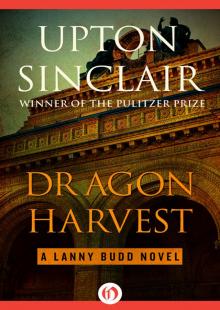 Dragon Harvest
Dragon Harvest The Jungle
The Jungle Sylvia's Marriage
Sylvia's Marriage Oil! A Novel by Upton Sinclair
Oil! A Novel by Upton Sinclair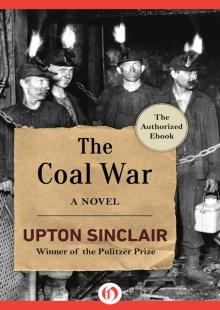 The Coal War: A Novel
The Coal War: A Novel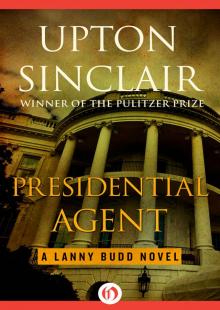 Presidential Agent
Presidential Agent World's End
World's End The Second-Story Man
The Second-Story Man O Shepherd, Speak!
O Shepherd, Speak! Wide Is the Gate
Wide Is the Gate The Return of Lanny Budd
The Return of Lanny Budd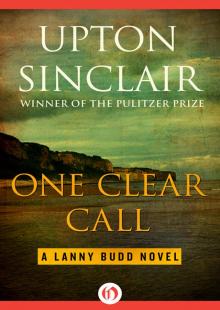 One Clear Call I
One Clear Call I 100%: the Story of a Patriot
100%: the Story of a Patriot The Machine
The Machine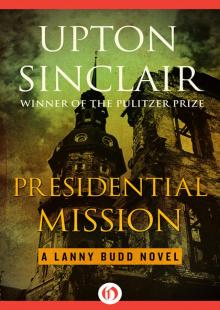 Presidential Mission
Presidential Mission A Cadet's Honor: Mark Mallory's Heroism
A Cadet's Honor: Mark Mallory's Heroism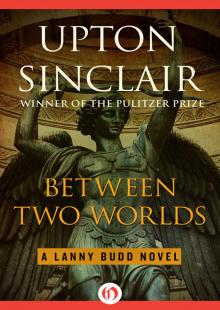 Between Two Worlds
Between Two Worlds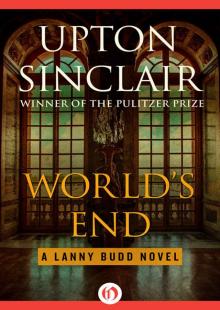 World's End (The Lanny Budd Novels)
World's End (The Lanny Budd Novels)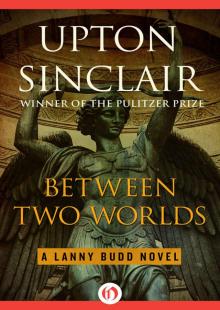 Between Two Worlds (The Lanny Budd Novels)
Between Two Worlds (The Lanny Budd Novels)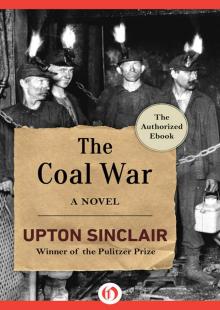 The Coal War
The Coal War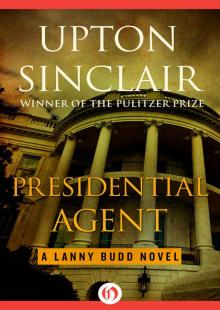 Presidential Agent (The Lanny Budd Novels)
Presidential Agent (The Lanny Budd Novels) Oil (filmed as There Will Be Blood)
Oil (filmed as There Will Be Blood) Wide Is the Gate (The Lanny Budd Novels)
Wide Is the Gate (The Lanny Budd Novels)